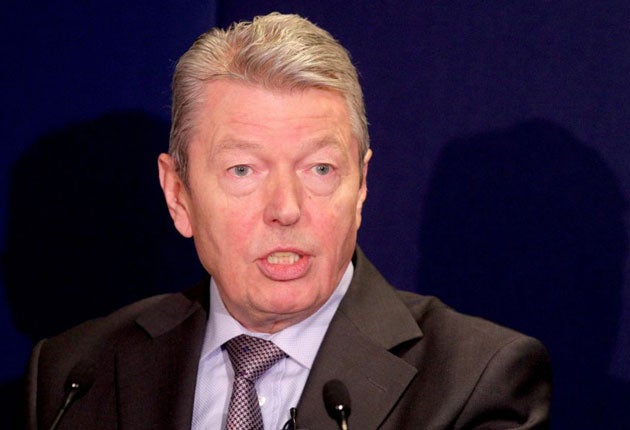Shadow chancellor Alan Johnson said today he would increase taxes in a bid to help the economy recover from the recession.
In his first speech in the job, he insisted tax rises had to play a bigger part than Labour has so far proposed in reducing the country's budget deficit.
Under his plans, they would include an additional £3.5 billion raised from the banks - on top of the Government's forthcoming £2.4 billion banks levy.
While insisting Labour would not increase personal taxation any further than planned, he said he accepted the coalition's freezing of the basic rate limit for income tax from 2013.
He indicated that he would not attempt to reverse the recent rise in capital gains tax either.
Taken together, the measures would raise £7.5 billion more than his predecessor Alistair Darling had planned.
The money could be used to offset cuts in infrastructure investment and support growth, Mr Johnson said.
He insisted he would stick to Mr Darling's plan to halve the deficit over four years, but said he wanted taxes to account for a greater ratio of the savings.
"Our policy remains to halve the deficit by 2013/14," he said.
"But I have looked again at the way in which we deliver that reduction, at the balance of tax and spending.
"My view is that specific, targeted tax changes need to do more of the work."
Mr Darling's plans envisaged about 70% of the savings coming from spending cuts and 30% from tax changes. Mr Johnson wants the ratio to be 60:40.
That is still short of the 50:50 split that Mr Miliband mooted during the Labour leadership campaign, but Mr Johnson later dismissed that approach, saying: "I think 60:40 is about the right balance."
Calling for extra taxes on the banks, the shadow chancellor said that the Government's plans for a bank levy were "inadequate" compared with the pain being inflicted on families.
"The banking sector is contributing £2.4 billion, while child benefit freezes and cuts will raise substantially more," he said in a speech at KPMG in the City.
"So families take the strain while bankers grab the bonuses. There is no justification for such an unfair sharing of the burden."
Ahead of Chancellor George Osborne's comprehensive spending review on Wednesday, Mr Johnson said he would work with the Government on "targeted tax rises that do not affect low and middle income families".
But he stressed: "We are not proposing to halve the deficit with increases in personal taxation beyond those already announced."
Mr Johnson also indicated he would not necessarily oppose all of the coalition's welfare reforms, including plans for medical assessments for disability living allowance claimants.
"There is a strong case for looking at disability living allowance and introducing a reformed gateway," he said.
"Of course it needs to be done properly - and the Government should be working closely with the sector to make sure it gets this right."
Mr Johnson insisted that it was possible to halve the departmental cuts announced by Mr Osborne in the emergency budget, saving £27 billion of spending on public services.
"It means we can still fund initiatives that are crucial to growth, like the Future Jobs Funds," he said.
"That way we can avoid the long-term scars from this recession resembling those of the Eighties and Nineties."
But the Tories claimed that Mr Johnson's plans would take the country "back to the brink of bankruptcy" and still left £44 billion of spending unaccounted for.
Michael Fallon, deputy chairman of the Conservative Party, said: "Labour's black hole just got bigger, not smaller.
"Ed Miliband promised a plan to close the deficit. All we got today was yet more spending proposals and a tax on banks that would need international agreement and wouldn't tackle the deficit."
Business leaders warned that banks could relocate in response to increasing levels of tax in the UK.
Institute of Directors spokesman Alistair Tebbit said his organisation was already concerned about the Government's planned levy.
"The chances of banking business disappearing overseas would increase significantly if - as advocated by Alan Johnson - the bank levy was increased by another £3.5bn," Mr Tebbit said.
"Further increases in the bank levy, designed by politicians to tap into anti-bank sentiment and raise some revenue, are very risky.
"Banks are perfectly capable of relocating their holding companies outside the UK and maintaining UK branches to conduct their UK business."
Mark Littlewood, director general of think tank the Institute of Economic Affairs, also warned against the proposed increase in tax on the banks.
"That would weaken the financial services sector by encouraging an acceleration of relocations to other countries," he said.
"Bankers, stockbrokers and hedge fund managers will continue to leave London if the tax burden becomes uncompetitive."
Subscribe to Independent Premium to bookmark this article
Want to bookmark your favourite articles and stories to read or reference later? Start your Independent Premium subscription today.


Join our commenting forum
Join thought-provoking conversations, follow other Independent readers and see their replies